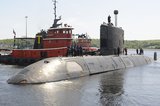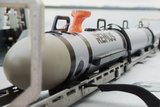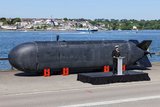TKMS introduces new submarine fuel cell
Thyssenkrupp Marine Systems (TKMS) has unveiled its 4th Generation Fuel Cell (FC4G) for utilisation in submarines, following completion of a comprehensive test programme for the propulsion system.
FC4G has undergone in excess of 70,000 operating hours of testing, demonstrating the hydrogen-fuelled system’s performance.
‘Our customers have been using our fuel cell systems for more than 15 years now,’ Rolf Wirtz, CEO of Thyssenkrupp Marine Systems, said.
‘With this fourth generation we are making something great even greater. This is the next big step with huge improvements in availability, redundancy, and stealth.’
The fuel cell is designed to be a high-availability modular system composed of redundant components to retain a maximum performance at all times, according to the company.
The system relies on the proven and safe hydrogen storage method of using metal hydride cylinders as was the case with previous generations, which do not contain any active components, so are less inclined to fail, holding the hydrogen molecules in place in the crystal lattice of the hydride.
Furthermore, since hydrogen is fed to the system in its purest form, no chemical conversion is required, so the efficiency of the overall system remains high.
The only by-product besides electrical energy is pure water, which is stored on board for weight compensation.
H2 is a gas that is available in most countries that the company would be looking to cell the fuel cell, and can be produced by utilising green energy sources by splitting water into H2 and O2.
With no by-products put overboard, the thermal and acoustic signatures produced are kept to a minimum, while TKMS says that the overall system efficiency is twice as good as a combustion engine.
‘These are the reasons why 38 systems were contracted so far with seven customer navies, another ten systems presently being under negotiation,’ Philipp Schön, head of product sales for submarines, added.
More from Naval Warfare
-
![What HII’s UK expansion could mean for Royal Navy’s uncrewed future]()
What HII’s UK expansion could mean for Royal Navy’s uncrewed future
As HII prepares to deliver its latest AI-enabled uncrewed surface vessel later this year, its major UK facility expansion aligns with the UK Royal Navy’s plans for a hybrid fleet.
-
![Can the West keep up with China’s “XXL” uncrewed submarines?]()
Can the West keep up with China’s “XXL” uncrewed submarines?
The UK, the US and Australia have all been working on “extra-large” uncrewed underwater vehicles, but China’s reported development of a significantly larger capability demonstrates the country’s rapid advancement in underwater warfare.
-
![First made-in-Finland US Coast Guard Arctic Security Cutter to be delivered in 2028]()
First made-in-Finland US Coast Guard Arctic Security Cutter to be delivered in 2028
The first Arctic Security Cutter will be built by Rauma Marine Constructions to be deployed in the US Arctic waters.
-
![Is the US Navy’s Golden Fleet initiative achievable?]()
Is the US Navy’s Golden Fleet initiative achievable?
The effort to provide the US Navy with Trump-class battleships might face financial, production and doctrinal obstacles.
-
![Will the US Navy surge production for OTH-WS missile?]()
Will the US Navy surge production for OTH-WS missile?
The USN is conducting a market search seeking additional sources capable of supplying 516 units of Over the Horizon – Weapons System Encanistered Missiles.























